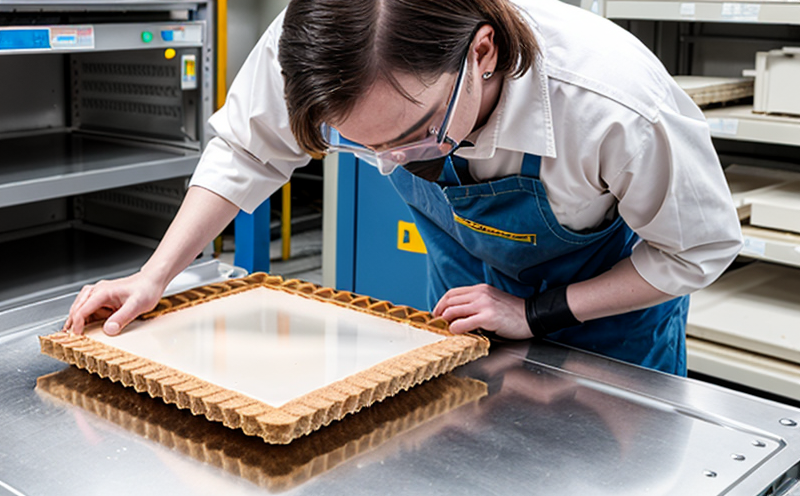ASTM F1528 Wafer Etch Depth Measurement Testing
The ASTM F1528 standard provides a method for measuring the depth of etching on semiconductor wafers, particularly focusing on silicon-based substrates. This critical test is essential in ensuring that the etching process adheres to precise specifications, which are fundamental for the reliability and performance of microchips and other semiconductor devices.
The etch depth measurement plays a pivotal role in quality control processes within the semiconductor industry. By accurately measuring the depth of etched features on wafers, manufacturers can ensure that their products meet strict industry standards and customer specifications. This service not only guarantees product quality but also helps to minimize costly rework or scrap.
The ASTM F1528 methodology involves several steps: first, the wafer undergoes a thorough cleaning process to remove any contaminants that could interfere with accurate measurements. Next, the etch depth is measured using advanced optical metrology instruments such as atomic force microscopes (AFM) and scanning electron microscopes (SEM). The testing procedure ensures that the depth of etching is consistent across all wafers in a production lot.
For quality managers and compliance officers, this service provides critical insights into the performance of their manufacturing processes. By adhering to ASTM F1528 standards, they can ensure their products meet rigorous international standards like ISO 9001:2015 and ASME Y14.5M-2013. R&D engineers rely on this testing to fine-tune etching parameters for new product designs, while procurement teams benefit from the assurance that suppliers are meeting exacting specifications.
The ASTM F1528 methodology is particularly important in ensuring consistency and reliability across semiconductor production lines. Variations in etch depth can lead to performance discrepancies among chips within a single wafer or between different wafers. This service helps manufacturers identify and rectify such issues early in the production process, thereby improving yield rates.
The test procedure also involves careful preparation of the samples. The wafers are typically cleaned using solvents approved by ASTM standards to ensure no residue affects the measurement results. After cleaning, the etch depth is measured using high-precision instruments capable of detecting minute differences in surface topography. This ensures that even small variations in etching can be detected and addressed.
Manufacturers who adhere to ASTM F1528 not only enhance their product quality but also build a reputation for reliability within the industry. Compliance with this standard is essential for companies aiming to meet stringent international regulations, such as those set by the International Organization for Standardization (ISO).
In summary, ASTM F1528 Wafer Etch Depth Measurement Testing is an indispensable service in ensuring that semiconductor wafers meet precise etching specifications. This ensures not only compliance with industry standards but also contributes to the overall quality and reliability of semiconductor devices.
Industry Applications
The ASTM F1528 Wafer Etch Depth Measurement Testing is widely used across various sectors within the semiconductor industry, including:
- Microelectronics Manufacturing: Ensuring consistent etching depth on silicon wafers for the production of integrated circuits.
- Memory Device Fabrication: Maintaining precise etch depths in memory chips to enhance performance and reliability.
- Power Semiconductor Production: Guaranteeing that power semiconductors meet stringent specifications for efficient operation and durability.
- Fabless Semiconductor Design: Supporting the design process by verifying that fabricated wafers comply with initial etching parameters.
The testing ensures that all semiconductor devices produced are consistent in quality, which is crucial given the complexity of modern integrated circuits. By adhering to ASTM F1528 standards, manufacturers can ensure their products meet the highest industry standards and customer expectations.
Eurolab Advantages
EuroLab offers unmatched expertise in ASTM F1528 Wafer Etch Depth Measurement Testing. Our team of experienced engineers and technicians ensures that every test adheres to strict international standards, providing reliable and accurate results.
- ISO 9001:2015 Compliance: EuroLab is certified to ISO 9001:2015, ensuring consistent quality in our testing services.
- Advanced Equipment: Utilizing state-of-the-art metrology instruments, we provide precise etch depth measurements that are crucial for semiconductor manufacturing.
- Dedicated Support: Our team of experts is available to answer any questions and provide guidance on test procedures and results interpretation.
- Rapid Turnaround Time: We pride ourselves on delivering timely results, allowing you to make informed decisions promptly.
EuroLab’s commitment to quality and accuracy sets us apart in the semiconductor testing industry. Our services are designed to meet your specific needs, whether for compliance with international standards or for internal quality control purposes.





